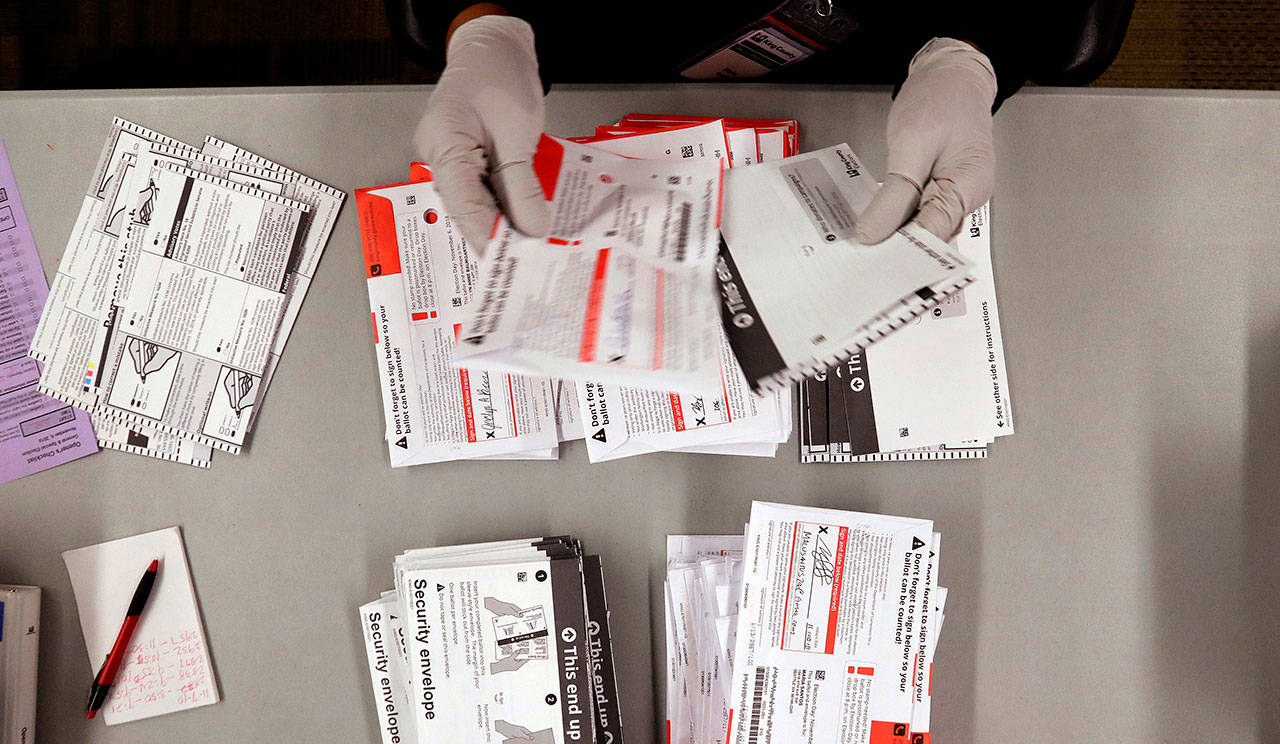By The Herald Editorial Board
With county election offices in Washington state wrapping up their counts of straggling ballots, the Nov. 6 general election can be viewed as a success, with none of the controversy and drama seen in Florida, for example.
The Secretary of State’s elections office estimates about 120,000 ballots remain to be counted before the election can be certified later this month, including about 1,900 in Snohomish County and 500 in Island County. A handful of races may require machine recounts, including the race for Position 2 in the 10th Legislative District where Democrat Dave Paul leads incumbent Republican Rep. Dave Hayes by about 340 votes, very close to the 0.5 percentage point difference that triggers a recount.
The other success reflected in the ballots this election was the sheer number of them. With nearly 3.1 million ballots returned by the more than 4.3 million registered voters, turnout is expected to top 71 percent, very near the turnout record for midterm elections that was set in 1958.
Credit that turnout on higher interest because of the unofficial referendum on President Trump’s first two years in office and four high-profile statewide ballot measures, but also on recent efforts by Secretary of State Kim Wyman’s office and state lawmakers to streamline voter registration and voting, including a temporary fix that meant voters didn’t have to affix postage to their ballots to mail them for the primary and general elections.
So, we’re all set for elections next year and in 2020, right?
Some cybersecurity experts aren’t convinced.
A report this week by the McClatchy Washington Bureau shared analysis by cybersecurity experts who claimed to have found vulnerabilities in the voter registration system of Washington state and North Carolina that were similar, “but much less porous” than those found in Georgia’s election systems.
Earlier this May, the U.S. Senate Intelligence Committee issued a report that found that hackers linked to the Russian government conducted a cyber campaign against the election infrastructure in at least 18 states, including Washington state, leading up to the 2016 election.
At the time, Wyman’s office said the hacking attempt was detected by the state’s election defenses, which blocked traffic from the IP addresses responsible for the attack; no voter registration data was compromised.
Nor were any election results jeopardized in the 2016 attack; county tabulation machines, for example, are “air-gapped” and not connected to the internet, and the state’s mail-in ballots provide a paper record of every vote.
Still, experts recently warned of lingering vulnerabilities in Georgia — and to a lesser extent in North Carolina and Washington state.
In Washington state’s case, the analysts claim, the system requires voter authentication to change registration information by submitting a voter’s driver’s license number and date the license was issued. Cyber experts warned that, were hackers able to obtain the driver’s license number and date of birth, “educated guesses” on the license issue date could allow access to voter registration data, then access to the information of other voters and, potentially, the elimination of voters from the registration rolls.
In the McClatchy report and in a press release, Wyman’s office expressed confidence in the system’s abilities to detect and prevent those kind of attacks.
The Secretary of State office noted that a software vendor linked to vulnerabilities in Georgia’s system wasn’t used by Washington state. And any request to change a voter’s registration information is followed by contact with that voter by email and a confirmation letter sent to the voter’s mailing address. Washington voters also can easily confirm their registration and personal information anytime by checking the MyVote.wa.gov website.
A final protection is offered by the state’s mail-in ballots themselves: If voters don’t receive a ballot prior to the election, there’s some time before the election deadline to correct a problem or at least cast a provisional vote.
Washington state’s voter registration and election system, under Wyman’s leadership, has been recognized as a national leader. Wyman spoke this September at a national election security summit, where she discussed the state’s joint security efforts with the Department of Homeland Security, the FBI and Washington National Guard, work whose goal has been to stay a step or two ahead of the hackers.
But hackers, foreign and domestic, will continue to probe for any potential vulnerabilities in all 50 states. When concerns are raised, especially for the systems believed to be the most secure, state officials must give due consideration to potential vulnerabilities and continue to look for new ways to fortify against them.
Talk to us
> Give us your news tips.
> Send us a letter to the editor.
> More Herald contact information.

























